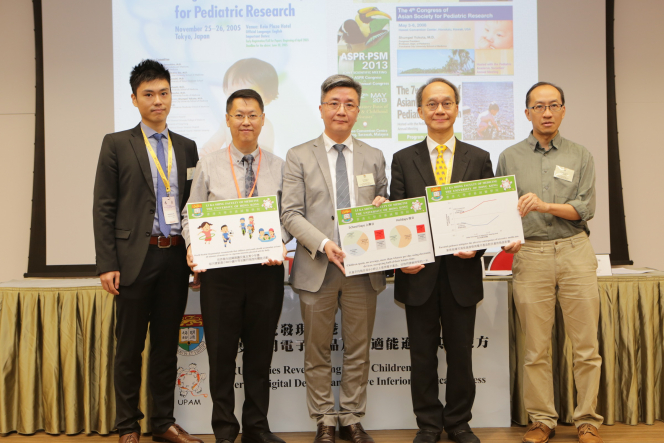Media
HKU Studies Reveal Hong Kong Children Overuse Digital Devices
and Have Inferior Physical Fitness
06 Oct 2017

(From left) Mr Frederick Ho Ka-wing, PhD candidate; Mr Wilfred Wong Hing-sang, Honorary Tutor; Dr Patrick Ip, Clinical Associate Professor; Professor Lau Yu-lung, Doris Zimmern Professor in Community Child Health and Chair Professor, Department of Paediatrics and Adolescent Medicine, Li Ka Shing Faculty of Medicine; and Dr Fu King-wa, Associate Professor, Journalism and Media Studies Centre, HKU took a group photo at the press conference.
Executive Summary
The general public is increasingly concerned about the use of digital device and the associated health risks in children. The Department of Paediatrics and Adolescent Medicine, Li Ka Shing Faculty of Medicine, The University of Hong Kong (HKU) has conducted a cohort study and a large cross-sectional study on the use of digital devices among Hong Kong children in the past five years (2012–2017). It was found that the time spent on digital devices by Hong Kong children was much higher than other areas in the world. Excessive use of digital devices without parental guidance has negative impacts on children’s behaviour, academic performance, and physical health status.
Physical fitness of Hong Kong children was found undesirable than their counterparts in the West and other parts of Asia in the study conducted by the HKU research team. Students participating in the School Physical Fitness Award Scheme (a territory-wide scheme serving 190,064 students in 427 schools) and a sport mentorship programme were found to be more physically fit, less obese, and have better mental wellbeing.
Background
Children today are increasingly using digital devices, including televisions, computers, smartphones, game consoles and tablet computers. More time spending on electronic screen products indicates less time for exercise and in-person social interactions which can put children at higher risk for physical and mental health problems.
Physical inactivity is an important public health issue worldwide. In 2006, HKU has found that only 6.1% of our children participated in 60 minutes of physical activity every day (Recommendation on Physical Activity by World Health Organization). Although the figure has risen to 8.3% in an official report in 2011, our next generation’s physical fitness is still a serious public health concern. More effective strategies should be developed to promote regular exercise.
Research design
HKU has recently conducted two studies on the use of digital devices and two programmes on physical activities in children and adolescents as below:
Use of digital devices
- A cohort of 681 children were followed from kindergarten (at age 5; academic year 2011-12) to primary school (at age 9; academic year 2014-15) with detailed records on the use of digital devices and assessments on behavioural, psychosocial, and academic outcomes.
- A population representative study of 7,585 P1–3 students was conducted in 2016 to assess the use of digital devices and Attention-Deficit Hyperactivity Disorder (ADHD) risk.
Physical activity
- School Physical Fitness Award Scheme: A population-based programme to promote and monitor physical fitness among Hong Kong students.
- A randomised controlled trial with 664 secondary school students who underwent either a sports mentorship programme or a traditional health education for one academic year. Physical fitness and mental health were assessed before and after intervention.
Findings
Use of digital devices
The population representative survey conducted by HKU in 2016 found that 74.8% of children spent more than 2 hours on digital devices, compared with 20.8% in United States and 47.4% in Beijing, China. On average, children spent more than 3 hours on school days and 7 hours in holidays on digital devices which is equivalent to half of their leisure time. Children spent most of their screen time on video gaming (36.9%), followed by television viewing (36.2%), studying (20.4%), and web browsing (6.5%).
The longitudinal cohort study conducted by HKU showed that pre-schoolers who spent more time on television viewing and video gaming at age 5 were more likely to be overweight, have behavioural problems including emotional problems and hyperactivity as well as poor academic performance at age 9. The positive link between screen time and risk of ADHD was also found in the HKU’s population representative study of primary school children. Such duration effect was insignificant when parents provided guidance on children’s television viewing and video gaming.
Physical inactivity
A total of 137,957 students participated in the School Physical Fitness Award Scheme in 2016/17 and the data was analysed by the HKU research team. Alarmingly, the flexibility, muscle strength, and cardiorespiratory fitness of Hong Kong students were lower than peers in China, Singapore, and Europe. Excitingly, longitudinal data showed that the School Physical Fitness Scheme can help physically less fit students to improve these attributes over three years.
Students who participated in the sports mentorship programme reported better mental wellbeing, higher resilience, and greater flexibility and muscle strength compared to those who participated in traditional health education.
Recommendations
Use of digital devices
The pattern of digital device usage among Hong Kong children is alarming. The findings showed that overuse of digital devices in preschool increases risk of obesity, behavioural problems, and poor academic performance in primary school. Parental guidance on the use of digital devices can protect children from the potential harm.
Physical activity
The School Physical Fitness Award Scheme is effective in promoting physical activity and fitness among Hong Kong students. Sports mentorship programme could improve the mental health and resilience of youth. In view of the physical activity benefits, the World Health Organization recommends children get at least 60 minutes of moderate-to-vigorous physical activity every day. Schools and parents should take an active role in helping children achieve these daily physical activity goals. The research team also recommends schools to actively participate in the School Physical Fitness Award Scheme and develop sports mentorship programmes.
Media enquiries
Please contact Li Ka Shing Faculty of Medicine of The University of Hong Kong by email (medkefa@hku.hk).
Please visit the website at http://www.med.hku.hk/news/ for press photos and presentation slides.
